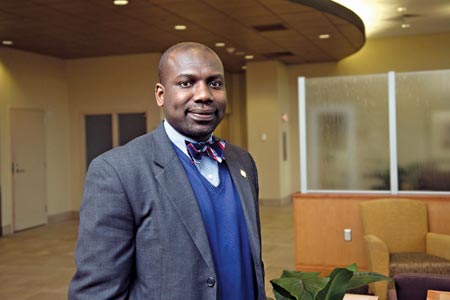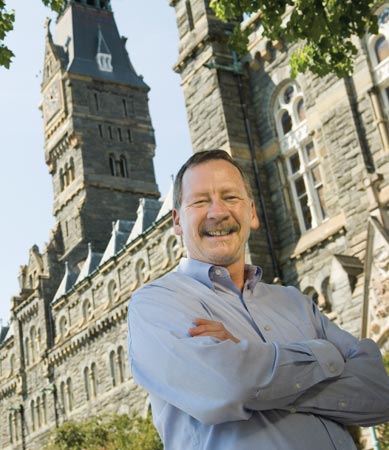By Debra Wood, RN
Alumni mentors help students in a tough economy

Mentoring current students—and helping them launch careers—is a natural part of giving back to the Johns Hopkins University School of Nursing, according to alumni Reginald E. Bannerman, MSN/MBA ’03, RN ’97, NE-BC, and R. Kevin Mallinson, PhD ’01, MSN ’97, RN, AACRN, FAAN.
“Hopkins has afforded me great opportunities to excel in life,” says Bannerman, director of Nursing, Psychiatry at Children’s National Medical Center in Washington, D.C. “Some people may give money, but others donate their time and energy. This is my way of giving back.”
Although mentoring Hopkins students takes time, Mallinson agrees it is a natural extension of his commitment to students and to the school where he earned a master’s and doctorate degree.
“I had a great experience at Hopkins and helping its students is part of belonging to the school,” Mallinson says. “It’s something you do as service back to the university.”
It’s About Networking
“I plan to make an impact and leave my legacy on the program,” says Bannerman. This lifetime member of the alumni association regularly meets with students, particularly men entering the profession, individually mentoring them, offering strategies to overcome struggles and guiding them through some rough spots.
He invites Hopkins nursing students to Children’s National to get to know the hospital and location in the District of Columbia and offers words of encouragement as they navigate their nursing career choices.
“It’s about networking,” Bannerman says. “If there’s a position open, Hopkins is the first place I look, because Hopkins nurses are always inquisitive. They want to grow and be on the cutting edge. They bring ingenuity.”
In addition, each year, Bannerman joins a Children’s National recruiter to visit the campus and talk with students.
“It’s good for students to know I went to Hopkins and came here and secured a good job,” Bannerman says. “If I did it, they could, too. That’s what I bring to the table.”
Hopkins senior Courtney Shay met Bannerman at a School of Nursing career fair in December as she was helping clean up and carrying the presenters’ things out. She took him up on his offer to pass her resume along to colleagues, to shadow him in February, and to discuss her career goals.
“I appreciated his reaching out to me, and I’ve been extremely impressed and grateful at how responsive and timely he has been in responding to my emails,” Shay says.
Bannerman earned his bachelor’s and master’s degrees at Hopkins and is considering returning for a doctorate of nursing practice degree. He never hesitates to pitch in and assist whenever a student or the school needs assistance.
“When the school calls, you salute and you serve,” Bannerman says. “It’s a call of duty. Whatever you have now is due to Hopkins. We owe it to each other and to future generations to give back.”
One-on-One Time

When Hopkins nursing students ask Mallinson for a hand with their job search, he spends time helping them home in on their goals rather than just snagging the first position that comes along.
“It’s mentorship, one-on-one time,” says Mallinson, an assistant professor of nursing at Georgetown University School of Nursing & Health Studies in Washington, D.C. “I help them to sharpen their focus.”
Mallinson asks them about what jobs they might want, what they know about the facility or organization they are targeting, and how that will fit in with their longer-term ambitions. He advises them to learn about a company’s mission and vision, its locations, and partnerships and then to evaluate whether they feel it would be a good fit for them.
“Last year was the first time students struggled to find positions, but all of the ones I helped got jobs,” Mallinson says. “I encouraged them to be persistent. Nurses leave and retire. I told them not to give up.”
Rather than accept a recruiter’s statement that the hospital was not hiring, Mallinson suggests they keep in touch with the recruiter and the nurse manager of the unit on which they hope to work. He advised them to inquire if they can shadow a nurse on that unit for a day.
“Amazingly, positions opened up for those who did that,” he recalls.
If students reach out to him for guidance early in their studies, he recom-mends they do something that sets them apart, such as spending a summer working in healthcare in South Africa or in Europe to learn more about the delivery of services in other parts of the world.
“Students should do something to make an employer look at them as a resource, not just someone to fill a vacancy on a unit,” Mallinson says. Even if they stay stateside and volunteer, students should “do something health-related and highlight to a prospective employer why they did that activity.”